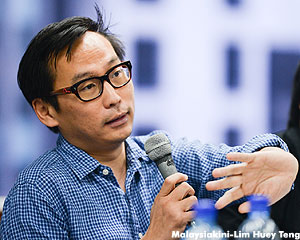Human rights group Lawyers for Liberty (LFL) has called for a reform of the attorney-general’s role, to make him accountable to Parliament and transfer prosecutorial powers to a truly independent and professional ‘Office of the Director of Public Prosecutions’.
This, said the NGO, is in order to facilitate greater transparency and accountability and to bring Malaysia in line with other developed nations, as well as to avoid conflicts of interest and address public perception that the AG serves the government of the day, not public interest.
LFL pointed to questions arising from the action of attorney-general Mohamed Apandi Ali in clearing Prime Minister Najib Abdul Razak from any criminal wrongdoing on the RM2.6 billion that was channelled into the prime minister’s personal bank accounts as one example.
"Such questionable decisions predictably bring further disrepute to the AG’s office and further enhance public perception that Apandi gives preferential treatment to those from or affiliated with the government, while selectively prosecuting the government’s political adversaries and dissidents.
 "The perception against Apandi’s actions in clearing the prime minister is made worse as he was appointed to the job after the prime minister suddenly removed his predecessor, Abdul Gani Patail, under controversial circumstances," LFL executive director Eric Paulsen (
photo
) said in a statement yesterday.
"The perception against Apandi’s actions in clearing the prime minister is made worse as he was appointed to the job after the prime minister suddenly removed his predecessor, Abdul Gani Patail, under controversial circumstances," LFL executive director Eric Paulsen (
photo
) said in a statement yesterday.
These issues and the perception problem, argued LFL, stems from the AG’s dual role in Malaysia as both the legal adviser to the government and as public prosecutor.
"It cannot be overemphasised that the AG does not just represent the government of the day. He also represents the state and the community at large as the guardian of public interests, justice and rule of law," LFL stressed.
Cannot represent both stakeholders
The NGO argued that in the face of conflict of interests, the AG cannot effectively represent both stakeholders in making prosecutorial decisions against members of the government, which is why the duties of the AG must be streamlined.
LFL also noted that the judiciary has refused to review the constitutional provisions that give the AG sole authority to institute, conduct or discontinue any criminal proceedings in Malaysia.
"The absence of any possibility of review by the judiciary, accountability to Parliament or even any obligation to consult other parties means that there is no measure of accountability in place to act as a check-and-balance on the AG’s powers," Paulsen said.
This, LFL noted is in stark contrast with several developed Commonwealth nations, where the AG, either by statute or by convention, cannot exercise prosecution power. This power is vested in the Director of Public Prosecutions (DPP), who acts independently from inappropriate political influence.
In England and Wales, Canada and Australia, LFL said, both the AG and the DPP are answerable to Parliament for their actions and decisions. The two offices of the AG and DPP are considered independent of each other.

